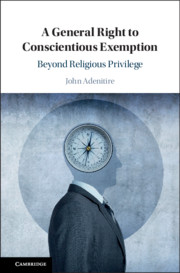Book contents
- A General Right to Conscientious Exemption
- A General Right to Conscientious Exemption
- Copyright page
- Contents
- Acknowledgements
- 1 Introduction
- 2 The General Right to Conscientious Exemption in US Law
- 3 The General Right to Conscientious Exemption in US Law: Beyond Religious Privilege?
- 4 The General Right to Conscientious Exemption in Canadian Law
- 5 The General Right to Conscientious Exemption in Canadian Law: Beyond Religious Privilege?
- 6 The General Right to Conscientious Exemption in UK Law
- 7 The General Right to Conscientious Exemption in UK Law: Beyond Religious Privilege?
- 8 The Liberal Model of Conscientious Exemptions
- 9 Balancing the General Right with Sexual Orientation Discrimination
- 10 Conclusion
- Index
1 - Introduction
Published online by Cambridge University Press: 27 July 2020
- A General Right to Conscientious Exemption
- A General Right to Conscientious Exemption
- Copyright page
- Contents
- Acknowledgements
- 1 Introduction
- 2 The General Right to Conscientious Exemption in US Law
- 3 The General Right to Conscientious Exemption in US Law: Beyond Religious Privilege?
- 4 The General Right to Conscientious Exemption in Canadian Law
- 5 The General Right to Conscientious Exemption in Canadian Law: Beyond Religious Privilege?
- 6 The General Right to Conscientious Exemption in UK Law
- 7 The General Right to Conscientious Exemption in UK Law: Beyond Religious Privilege?
- 8 The Liberal Model of Conscientious Exemptions
- 9 Balancing the General Right with Sexual Orientation Discrimination
- 10 Conclusion
- Index
Summary
The chapter introduces the main claims of the book, how they are defended and their implications. The chapter then makes a positive case in favour of the general right to conscientious exemption and for it being equally available to religious and non-religious conscientious objectors. It argues that a non-absolute right to conscientious exemption is justified by reference to a cluster of moral values, including the demands of the state’s duty of neutral pluralism (the duty being grounded in the value of individual moral responsibility and respect for ethical pluralism), respect for personal autonomy, freedom of conscience and concern for individual well-being. The chapter justifies the institution of the general right by showing that it provides holders of minority moral views with an alternative forum, i.e. a court of law, where they may be able to bring a claim and ask for exemptions from legal obligations which impinge on their conscience. It concludes by showing that the justifications provided for exemptions generally and for the general right cannot justify the right being a privilege of only those that object on the basis of non-religious beliefs. Non-religious conscientious beliefs should also benefit from the general right.
Keywords
- Type
- Chapter
- Information
- A General Right to Conscientious ExemptionBeyond Religious Privilege, pp. 1 - 19Publisher: Cambridge University PressPrint publication year: 2020

